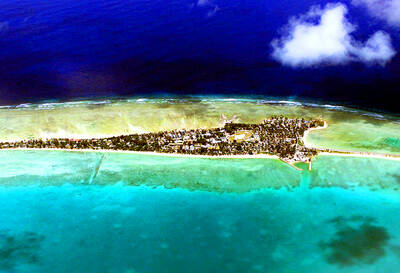A bomb on a cart pulled by a motorcycle killed at least 20 in a crowd of Shiite pilgrims yesterday in Iraq’s holy city of Kerbala, where hundreds of thousands have gathered for a religious rite, police said.
The attack was the third this week on Shiites making the arduous religious trek to the city south of Baghdad, stoking condemnations from pilgrims of Iraqi politicians in the tense run up to a potentially violent parliamentary election next month.
Police and hospital sources said that up to 110 people were wounded when the bomb exploded in Kerbala, 80km southwest of the capital.
Sunni Islamist insurgents such as al-Qaeda frequently hit Shiite gatherings with suicide bombers, grenades and shootings in the hope of restarting the bloody sectarian strife that nearly tore Iraq apart in 2006 to 2007.
“I feel sorry to see that Iraqi politicians spare no efforts preparing for the next election while at the same time bodies of innocents are ripped apart by bombs,” said Abdul-Amir Hassan, 41, a high school teacher who spent a week walking to Kerbala.
“Recent terrorist attacks targeting pilgrims across the country prove the confusion and inability of the security forces to tackle a sensitive situation like Arbain,” he said.
Arbain marks 40 days of mourning for Hussein, the Prophet Mohammed’s grandson, who died in the 7th century battle.
Police said three people were killed and 21 wounded late on Tuesday when a bomb attached to a military vehicle exploded in Kerbala. On Monday, a female suicide bomber killed more than 40 pilgrims on the outskirts of Baghdad.
Iraqi Prime Minister Nouri al-Maliki has made improved security across Iraq a central theme of his campaign for the March 7 parliamentary election and called on the security forces to ensure pilgrims heading to Kerbala are protected.
The attacks on pilgrims and a series of coordinated suicide bombings in Baghdad since August could harm his efforts to claim credit for an overall drop in violence in the past two years and may be aimed at undermining his chance of re-election.
City officials said that some 30,000 security forces were deployed in Kerbala, with 2,500 women assigned to searching female pilgrims wearing traditional abaya robes.
They estimated 6 million pilgrims — from Iraq, Kuwait, Oman, Saudi Arabia, Bahrain, India, Pakistan, the US and other nations — were in Kerbala.
Pilgrims in Kerbala complained bitterly that the government had failed to protect them.
“When I left my house four days ago, I never stopped thinking about getting killed. I lost my brother last Ashura ... and I always say I could be next,” said Jasim Mohammed, a civil servant, referring to another Shiite ritual, Ashura.

DISASTER: The Bangladesh Meteorological Department recorded a magnitude 5.7 and tremors reached as far as Kolkata, India, more than 300km away from the epicenter A powerful earthquake struck Bangladesh yesterday outside the crowded capital, Dhaka, killing at least five people and injuring about a hundred, the government said. The magnitude 5.5 quake struck at 10:38am near Narsingdi, Bangladesh, about 33km from Dhaka, the US Geological Survey (USGS) said. The earthquake sparked fear and chaos with many in the Muslim-majority nation of 170 million people at home on their day off. AFP reporters in Dhaka said they saw people weeping in the streets while others appeared shocked. Bangladesh Interim Leader Muhammad Yunus expressed his “deep shock and sorrow over the news of casualties in various districts.” At least five people,

ON THE LAM: The Brazilian Supreme Court said that the former president tried to burn his ankle monitor off as part of an attempt to orchestrate his escape from Brazil Former Brazilian president Jair Bolsonaro — under house arrest while he appeals a conviction for a foiled coup attempt — was taken into custody on Saturday after the Brazilian Supreme Court deemed him a high flight risk. The court said the far-right firebrand — who was sentenced to 27 years in prison over a scheme to stop Brazilian President Luiz Inacio Lula da Silva from taking office after the 2022 elections — had attempted to disable his ankle monitor to flee. Supreme Court judge Alexandre de Moraes said Bolsonaro’s detention was a preventive measure as final appeals play out. In a video made

It is one of the world’s most famous unsolved codes whose answer could sell for a fortune — but two US friends say they have already found the secret hidden by Kryptos. The S-shaped copper sculpture has baffled cryptography enthusiasts since its 1990 installation on the grounds of the CIA headquarters in Virginia, with three of its four messages deciphered so far. Yet K4, the final passage, has kept codebreakers scratching their heads. Sculptor Jim Sanborn, 80, has been so overwhelmed by guesses that he started charging US$50 for each response. Sanborn in August announced he would auction the 97-character solution to K4

SHOW OF FORCE: The US has held nine multilateral drills near Guam in the past four months, which Australia said was important to deter coercion in the region Five Chinese research vessels, including ships used for space and missile tracking and underwater mapping, were active in the northwest Pacific last month, as the US stepped up military exercises, data compiled by a Guam-based group shows. Rapid militarization in the northern Pacific gets insufficient attention, the Pacific Center for Island Security said, adding that it makes island populations a potential target in any great-power conflict. “If you look at the number of US and bilateral and multilateral exercises, there is a lot of activity,” Leland Bettis, the director of the group that seeks to flag regional security risks, said in an